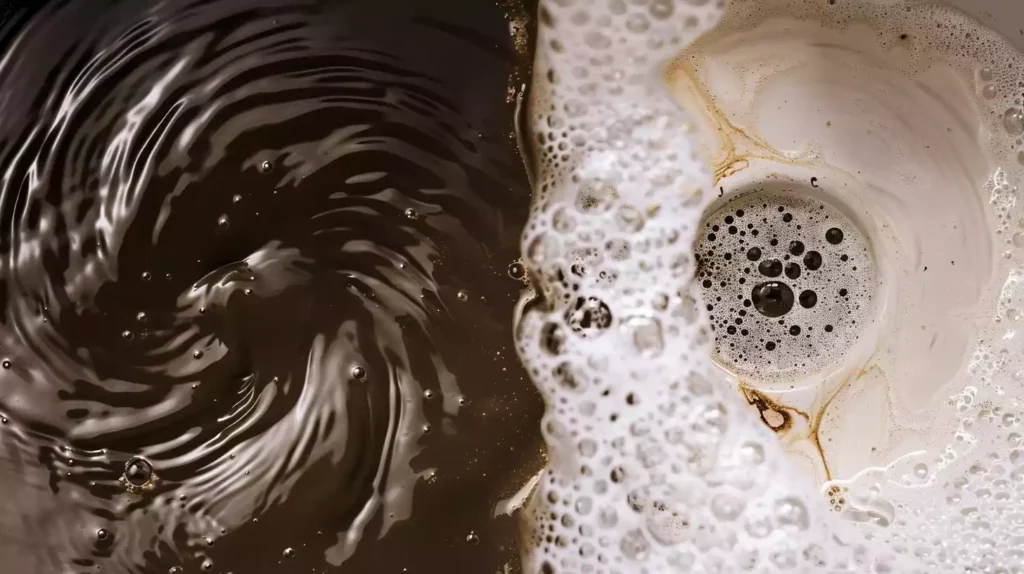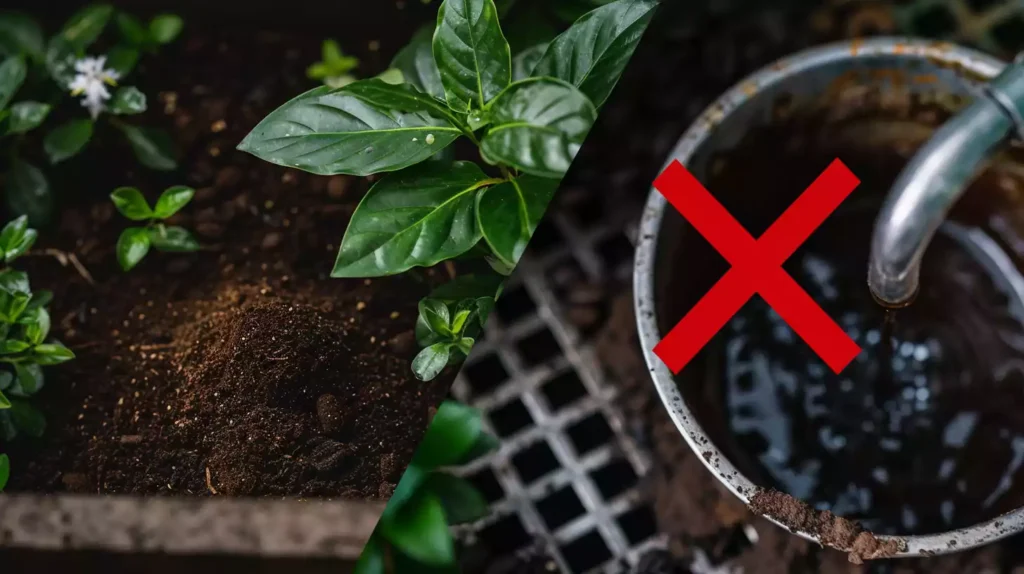Coffee grounds should not be disposed of down the sink, as they can combine with grease to form a thick, impenetrable residue that clogs pipes and causes backups, overflows, and pipe corrosion.
This can lead to costly repairs, damage to kitchen fixtures, and unsanitary conditions that pose health risks. Coffee grounds can also accumulate in grease traps, causing them to clog easily and block drain pipes.
To avoid these consequences, it’s essential to understand the risks associated with coffee grounds and grease buildup and consider alternative disposal methods that protect both your plumbing system and the environment, and there’s more to learn about how to do it effectively.
Quick Summary
- Coffee grounds and grease combine to form a thick, impenetrable residue that can clog pipes and cause backups, overflows, and pipe corrosion.
- Clogged pipes can lead to costly repairs, damage to kitchen fixtures, and unsanitary conditions that pose health risks.
- Coffee grounds can accumulate in grease traps, causing them to clog easily and block drain pipes, leading to messy and smelly consequences.
- Proper disposal of coffee grounds is essential to preventing clogs and maintaining a smooth-flowing drainage system, especially for septic systems.
- Composting or binning coffee grounds is a better disposal method than pouring them down the sink, as it prevents clogs and promotes a healthy environment.

The Dangers of Clogged Pipes
I’m guilty of committing a culinary crime – carelessly disposing of coffee grounds down the sink.
Little did I know, those tiny particles were accumulating and conspiring with other substances in the pipes, plotting to wreak havoc on my plumbing system.
The clogs they formed were like ticking time bombs, waiting to unleash a torrent of troubles, including backups, overflows, and even pipe corrosion.
The consequences were dire – costly repairs, damage to my beloved kitchen, and unsanitary conditions that made me shudder.
But that’s not all… these sneaky blockages also caused water to stagnate, creating a perfect breeding ground for bacteria and mold.
It was like inviting a bunch of unwelcome guests to a toxic party, and they were contaminating my water supply, posing health risks to me and my loved ones.
I realized that it was high time I took responsibility for my actions and disposed of coffee grounds in a more environmentally friendly way.
Now I make it a point to compost them or throw them away in the trash, ensuring my plumbing system remains safe, functional, and clog-free.
Coffee Grounds and Grease Buildup
When coffee grounds are poured down the sink, they can combine with grease and other substances to form a thick, impenetrable residue.
This residue can accumulate in grease traps, causing them to clog easily, and eventually, block drain pipes.
As a result, it is essential to understand the interplay between coffee grounds and grease buildup to prevent these issues and maintain a smooth-flowing drainage system.
Grease Traps Clog Easy
I’ve fallen victim to the wrath of clogged grease traps, and I’ve learned the hard way that it’s a messy, smelly, and costly mistake.
It starts innocently enough – a few coffee grounds here, a splash of grease there – but before you know it, they’ve combined to form a concrete-like barrier that refuses to budge.
I’ve seen it happen: the water slows to a trickle, and then, suddenly, sewage is backing up into my kitchen, accompanied by a stench that could knock a person off their feet.
It’s a nightmare, and one that can be avoided with a little foresight and elbow grease.
I’ve learned to take my maintenance duties seriously, scrubbing away at my grease trap with regularity and making sure to dispose of those pesky coffee grounds and grease in a responsible manner.
Trust me, it’s worth the effort – the last thing I want is to deal with the fallout of a clogged grease trap again.
Drain Pipes Get Blocked
I’ve witnessed firsthand the nefarious duo of coffee grounds and grease wreaking havoc on my kitchen plumbing.
It starts innocently enough – a careless pour of coffee dregs down the drain, a sloppy scrape of last night’s greasy pizza plate.
But before I know it, these seemingly harmless actions have snowballed into a catastrophic blockage that turns my sink into a stagnant swamp.
The villainous twosome conspires against me, clinging to the inner walls of my drain pipes like a bad habit, gradually building up a thick, impenetrable layer that restricts water flow and turns my morning routine into a slow-motion nightmare.
The consequences of ignoring this issue are dire – I’ve faced the music of costly repairs, damaged pipes, and even the health hazards of a festering mess.
That’s why I’ve learned to take proactive measures, composting my coffee grounds and properly disposing of grease to avoid those devastating drain pipe blockages.
It’s a hard-won battle, but one I’m determined to win.
The Impact on Septic Systems
As I pour the remnants of my morning coffee down the drain, I never thought I was declaring war on my septic system.
But, unbeknownst to me, those innocent-looking coffee grounds were secretly plotting to wreak havoc on my underground wastewater world.
The high concentration of organic matter in those grounds can overwhelm my system, causing the beneficial bacteria to go AWOL and the drainfields to become clogged.
It’s like a ticking time bomb, waiting to unleash a sewage backup into my home, contaminating my water sources, and putting my health at risk.
And if that’s not enough, the oils and acids in those grounds are like a corrosive cocktail, slowly eating away at my septic system’s components, reducing their lifespan and leaving me with a hefty repair bill.
I’ve learned my lesson – it’s time to think about the long-term consequences of my daily coffee habit and take proactive measures to protect my sensitive ecosystem.
No more coffee grounds down the drain for me!
Better Disposal Methods Exist
As I savor my morning coffee, I’m reminded of the pesky problem of disposing of those grounds.
Fortunately, I’ve discovered some environmentally friendly methods that can help mitigate the risks associated with septic system damage. I’ve started wrapping my used coffee grounds in a biodegradable material or paper towel, like a little eco-friendly present, before tossing them in the trash.
This not only prevents mess and odors but also gives me a sense of satisfaction knowing I’m doing my part for the planet.
Another approach I’ve adopted is using a designated coffee ground container, which I empty regularly and keep spotless to prevent mold growth. It’s become a fun little ritual, almost like tending to a tiny garden.
And the best part? Some cities even offer organic waste collection programs that accept coffee grounds, which are then transformed into nutrient-rich soil amendments. I feel like I’m contributing to a greater good, and my septic system (and the environment) thank me for it.
Composting Coffee Grounds Benefits

Rich in nitrogen, phosphorus, and potassium, coffee grounds are the ultimate superheroes for my plants, boosting their growth and vitality like a shot of espresso. The added bonus? My soil structure and fertility get a major upgrade, making it a haven for beneficial microorganisms to thrive. It’s like creating a luxurious spa day for my soil!
But that’s not all – composted coffee grounds also have the remarkable ability to retain soil moisture, reducing the need for frequent watering. It’s like having a personal assistant for my plants, ensuring they stay hydrated and happy.
And, as an added perk, the grounds act as a natural pest repellent, keeping those pesky ants, snails, and slugs at bay. It’s like having my own secret garden, free from the nasty chemicals that can harm the environment.
Proper Disposal for a Healthy Drain
The perils of coffee grounds down the sink! I’ve learned the hard way that they can wreak havoc on my plumbing.
But don’t worry, I’ve got some tricks up my sleeve to keep my drain healthy and happy.
I make sure to bin those grounds: I wrap them in a paper towel or coffee filter to prevent any messy surprises and stinky odors from lingering.
My trusty drain screen or filter is my new BFF. It catches those pesky grounds and other debris before they cause any trouble, making cleanup a breeze.
And after a coffee-filled morning, I give my sink a hot water hug. It helps dissolve any remaining residue, leaving my drain feeling fresh and clean.
With these simple habits, I can enjoy my daily cuppa without worrying about clogged pipes and plumbing nightmares!

